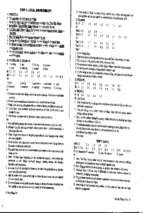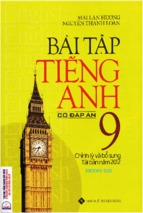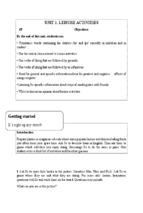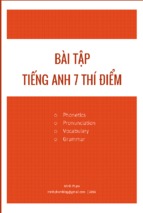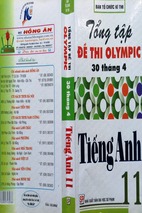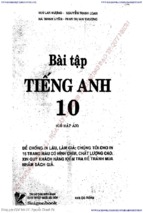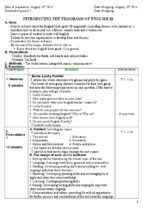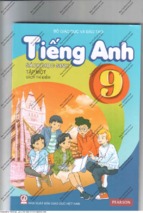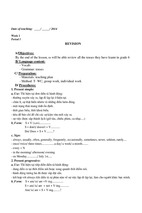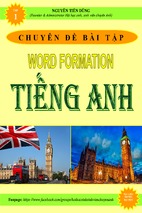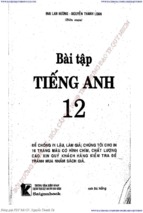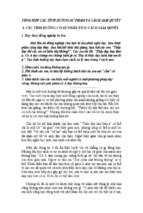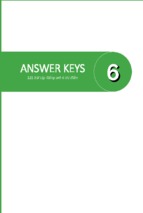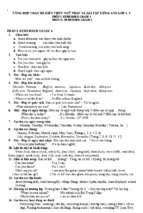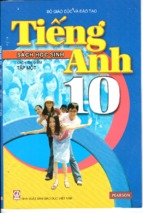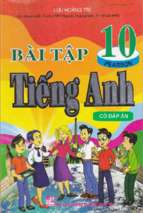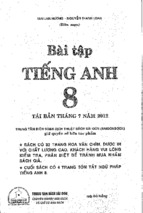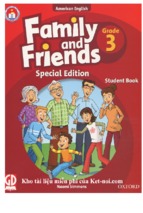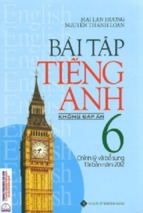CÁCH ĐỔI SANG CÂU NGHI VẤN
1
CÁCH ĐỔI SANG CÂU NGHI VẤN
1. Nhìn sau chủ từ xem có động từ đặc biệt hay không, nếu có thì chuyển ra trước
chủ từ. Nếu không có thì mượn trợ động từ DO, DOES, DID.
2. Nếu thì hiện tại mà chủ từ là số nhiều (tức là từ 2 người /vật trở lên) hoặc chủ từ
là I, You thì dùng DO. Nếu số ít thì dùng DOES.
3. Nếu thì quá khứ đơn thì dùng DID (số ít số nhiều gì cũng vậy)
4. Những động từ đặc biệt có thể chuyển ra trước chủ từ để làm câu hỏi là:
BE (is, am, are, was, were) WILL, WOULD, SHALL, SHOULD, MAY,
MIGHT
MUST, CAN, COULD, OUGHT
*Lưu ý: Khi mượn trợ động từ DOES, DID thì động từ sau chủ từ phải đổi
vêề nguyên mẫẫu.
Trên đây là những động từ mà khi đổi sang câu nghi vấn có thể yên tâm mà chuyển
ra trước chủ từ mà không cần phải suy xét gì. Ngoài danh sách một số động từ mà
trong trường hợp nào đó nó có thể là động từ đặc biệt nhưng trong trường hợp khác
thì lại không phải là động từ đặc biệt.
5. HAVE:
Chữ have rắc rối ở chỗ nó có nhiều nghĩa nên có lúc là động từ đặc biệt, có lúc
không. Để sử dụng đúng chữ này chỉ cần nhớ như sau: Nhìn phía sau nó nếu có
quá khứ phân từ (V3/V-ed) thì nó là động từ đặc biệt, nếu không có V3/V-ed thì nó
là động từ thường.
Biên soạn bởi Mr. Cucku- Chi têết liên h ệ ĐT 0944 277 129
EXERCISES
Đổi sang nghi vấn những câu sau đây:
1. They need a good book...............................................................................................
2. I would like to go to the zoo........................................................................................
3. She might be right.........................................................................................................
4. They have had lunch already........................................................................................
5. She had to meet her mother..........................................................................................
6. There should be a dog in the house..............................................................................
7. The dogs chase after the cats........................................................................................
8. A lot of sugar must be bought......................................................................................
9. The dog ran after me.....................................................................................................
10.He does business for pleasure.......................................................................................
11.They might know that...................................................................................................
12.Everything had been done before he came...................................................................
13.The woman has to wear uniform..................................................................................
14.They could swim here...................................................................................................
15.The thief should have taken everything yesterday.......................................................
16.My brother goes to school at 6 every day.....................................................................
17.She stayed at home because she was sick.....................................................................
18.The men walk to work every day.................................................................................
19.He drinks a lot of beer..................................................................................................
20.The tree must be 10 meters high...................................................................................
Biên soạn bởi Mr. Cucku- Chi têết liên h ệ ĐT 0944 277 129
3
TOO – SO, EITHER - NEITHER
1. Too - so: Cũng vậy
Dùng cho câu xác định.
Công thức:
Câu xác định. S [] , too
Câu xác định. So
S
[] : Là động từ đặt biệt, hoặc trợ động từ (Nhìn ở câu đầu)
I am a teacher, and so is he. (Tôi là giáo viên, anh ta cũng vậy)
I am a teacher, and he is, too.
Ghi chú :
Câu đầu có to be nên câu sau cũng dùng to be.
He likes dogs, and so do I.
He likes dogs, and I do, too (Anh ta thích chó, tôi cũng vậy)
Ghi chú :
Câu đầu không có động từ đặt biệt, câu sau phải mựợn trợ động từ.
2. Neither - either: Cũng không
Dùng cho câu phủ định
Công thức:
Câu phủ định. Neither [] S
Câu phủ định. S [] not either
[] : giống như trên
I don't like dogs, and neither does he.
I don't like dogs, and he does not either. (Tôi không thích chó, anh ta cũng không)
EXERCISES
Dùng too, so, either, neither viết tiếp các câu sau (Mỗi câu viết 2 cấu trúc).
1. We are tired, and ……………………………………………………. (he)
2. My father’s got a car, and ……………………………. (my parents)
3. The man doesn’t take it, and ………………………………………………. (we)
4. We didn’t eat anything this morning, and ……………………………. (the cat)
5. The woman takes it, and ……………………………………………………. (I)
Biên soạn bởi Mr. Cucku- Chi têết liên h ệ ĐT 0944 277 129
6. Tom didn’t have any books, and …………………………………. (his friends)
7. I can swim, and ……………………………………………………. (you)
8. This film looks interesting, and ………………………………………. (that film)
9. Your brother must do this work, and …………………………………………. (I)
10.My dog never barks, and ……………………………………………. (your dogs)
11.You have to take a bath right away, and …………………………………. (she)
12.Everything is not ok, and ……………………………………. (these problems)
13.Nothing can prevent him from going there, and …………………………. (you)
14.Everyone knows him, and …………………………………………………. (you)
15.Nobody knew why he was absent, and ………………………………………. (I)
16.The workers must be working very hard, and ……………………………. (she)
17.You must practice speaking English every day, and ………………………….(I)
18. I have told you, and ………………………………………………. (your son)
19.She hasn’t bought a glass of water, and ……………………………………. (we)
20.None of my friends has come, and ………………………………………. (you)
21.She can never drive a car, and ……………………………………………. (we)
22.We like him, and……………………………………………………. (you)
23.They have to go now, and ………………………………………. (my daughter)
24.The men don’t take it, and …………………………………………………. (we)
25.They must have gone, and …………………………………………………. (she)
26.The man who told me about that looked nice, and ………………………. (you)
27.He put it away, and ……………………………………………………. (you)
28.They couldn’t swim, and ……………………………………………………. (I)
29.Mrs Brown won’t be late, and ……………………………………………. (they)
30.My mother’s come, and ……………………………………. (my grand parents)
Biên soạn bởi Mr. Cucku- Chi têết liên h ệ ĐT 0944 277 129
5
CÂU HỎI ĐUÔI
Công thức:
S + V + O , [ ] + ĐẠI TỪ ?
Trong đó:
Đại từ : Lấy chủ từ câu đầu đổi thành đại từ.
Đàn ông số ít ---------------------------------------------------> he
Đàn bà số ít-----------------------------------------------------> she
Vật số ít ---------------------------------------------------------> it
There ----------------------------------------------------------> there
This --------------------------------------------------------------> it
That --------------------------------------------------------------> it
These -----------------------------------------------------------> they
Those -----------------------------------------------------------> they
Số nhiều -------------------------------------------------------> they
Các đại từ như: They, he, she ... thì giữ nguyên.
[ ] : Là vị trí mà ta phải đặt một từ nào vào đó. Cách tìm từ này như sau: Nhìn ở
câu đầu nếu có động từ đặc biệt thì đem đặt vào vị trí [ ] , nếu không có thì mượn
trợ động từ do, does, did.
Những động từ đặc biệt có thể chuyển ra vị trí [ ] mà không cần phải mượn trợ
động từ xem bên phần cách đổi sang câu nghi vấn.
- Nếu câu đầu có NOT, hoặc các yếu tố phủ định như: Never, rarely, scarcely, no,
hardly, seldom, neither, nor, none, few, little ...., thì [ ] không có NOT, nếu câu
đầu không có NOT thì [ ] có NOT.
Ví dụ: Lan can go, can't she? (Động từ đặt biệt đem can ra sau)
Tom likes it, doesn't he? (Không có động từ đặc biệt mà chủ từ số ít, động từ ở
hiện tại nên mượn trợ động từ does)
The dogs won't run, will they? (Câu đầu có not nên câu sau không có not)
Trên đây là công thức cơ bản, tuy nhiên có một số dạng đặc biệt mà cần nhớ.
NHỮNG DẠNG ĐẶC BIỆT:
1. I am --------> Aren't I ? (Nhưng nếu là: I am not ... thì lại dùng: am I?)
I am a student, aren't I?
2. Let's --------> Shall we?
Nobody, no one, everyone, everybody, someone, somebody ---------> [ ] they?
Nobody is here, are they?
Biên soạn bởi Mr. Cucku- Chi têết liên h ệ ĐT 0944 277 129
3. Câu mệnh lệnh (không có chủ từ) -------> Will you?
Go out with me, will you? (Câu mệnh lệnh)
Don't take it, will you? (Mệnh lệnh, dù có not hay không cũng dùng will you)
Những lỗi sai thường gặp khi làm bài tập câu hỏi đuôi:
1) Nhầm 's thành is :
Cả is và has đều có cách viết rút gọn là 's, tuy nhiên theo thói quen cứ thấy 's là
cho rằng đó là is rút gọn nên khi đem ra phía sau chỗ
rồi "phục hồi" chúng
thành chữ is.
Cách khắc phục lỗi này:
Nếu nhìn thấy phía sau có p.p (động từ cột 3 hoặc thêm ed) thì nên xem lại nếu
không phải câu bị động thì 's đó chính là has.
2) Không nhận ra 'd :
'd là viết tắt của would hoặc had, do đó nếu người làm không cẩn thận sẽ lúng
túng và chọn
sai.
Cách khắc phục lỗi này:
- Nếu nhìn phía sau có better/ .pp thì 'd đó là viết tắt của had.
- Nếu phía sau có rather / like / love hoặc các động từ nguyên mẫu khác thì 'd là
viết tắt của would.
Biên soạn bởi Mr. Cucku- Chi têết liên h ệ ĐT 0944 277 129
EXERCISES
1. My father’s got a car, …………………..?
2. The man doesn’t take it, …………………..?
3. We didn’t eat anything this morning, …………………..?
4. The woman takes it, …………………..?
5. There aren’t any books on the table, …………………..?
6. This film looks interesting, …………………..
7. Your brother must do this work, …………………..?
8. My dog never barks…………………..?
9. You have to take a bath right away, …………………..?
10.You’d better go and see him, …………………..?
11.She’d like to join in the army, …………………..?
12.Everything is ok,…………………..?
13.Nothing can prevent him from going there,…………………..?
14.Everyone knows him,…………………..?
15.Nobody knew why he was absent,…………………..?
16.Do what I have told you,…………………..?
17.Have a glass of water,…………………..?
18.None of my friends have come,…………………..?
19.She can neither drive a car nor ride a bike,…………………..?
20.You and your friends do morning exercise every day,…………………..?
21.He hardly goes to school by bike,…………………..?
22.Your name is Thao,…………………..?
23.The rich usually live in big houses ,…………………..?
24.He’s never met you before ,…………………..?
25.Nothing matters,…………………..?
26.Nobody is going to the mosque,…………………..?
27.I’m not supposed to be here on time,…………………..?
28.Don’t be late,…………………..?
29.Have some more coffee,…………………..?
30.Your father used to work in a factory,…………………..
Biên soạn bởi Mr. Cucku- Chi têết liên h ệ ĐT 0944 277 129
6
THỂ SAI BẢO (Causative form)
Công thức:
Có 2 công thức: Chủ động và bị động.
Chủ động: S + HAVE + O + BARE INF.
Bị động: S + HAVE + O + P.P
Ví dụ: I have them build my house. (Chủ động)
I have my house built. (Bị động)
Ngoài ra động từ GET cũng được dùng trong thể sai bảo nhưng công thức khác
với HAVE khi dùng chủ động.
Chủ động: S + GET + O + TO Inf.
Bị động: S + GET + O + P.P
Ví dụ: I get them to repair my house. (Chủ động)
I get my house repaired. (Bị động)
MỞ RỘNG: Ngoài HAVE và GET người ta còn dùng MAKE và LET với
công thức như sau:
S + MAKE + O + BARE Inf.
S + LET + O + BARE Inf.
Các động từ còn lại như ask, want …. Ta dùng TO Inf.
EXERCISES
1.
2.
3.
4.
5.
6.
I. Chọn đáp án đúng:
I'll have the boys..........................the chairs.
A. paint
B. to paint
C. painted
I am going to have a new house..........................
A. build
B. to build
C. built
Have these flowers.......................... to her office, please.
A. taken
B. taking
C. take
You should have your car.......................... before going.
A. servicing
B. to service
C. service
I'll have a new dress.......................... for my daughter.
A. making
B.to make
C. make
Pupils should have their eyes.......................... regularly.
Biên soạn bởi Mr. Cucku- Chi têết liên h ệ ĐT 0944 277 129
D. painting
D. building
D. to take
D. serviced
D. made
A. tested
B. to test
C. test
D. testing
7. Lisa had the roof.......................... yesterday.
A. repair
B. repaired
C. to repair
D. repairing
8. They have just had air conditioning.......................... in their house.
A. install
B. to install
C. installed
D. installing
9. We had the room.......................... yesterday
A. decorates
B. had decorated
C. decorated
D. decorating
10. The villagers have had the use of this washing machine.......................... by this engineer.
A. explain
B. explained
C. to explain
D. explains
11. By.......................... the housework done, we have time to further our studies.
A. taking
B. to have
C. having
D. to get
12.The government has had new houses.......................... in the rural areas.
A. build
B. built
C. to be built
D. building
13.They had the swamp.......................... last year.
A. drain
B. to drain
C. draining
D. drained
14. She is going to have her wedding dress..........................
A. cutting
B. cuts
C. cut
D. to cut
15. It's about time you had your house..........................
A. whitewash
B. whitewashed
C. whitewashing D. to whitewash
16.I'm sorry I'm late, but I .......................... my watch.......................... on the way here.
A. have/cleaned B. had/clean
C. had/cleaned
D. had/to clean
17.Please have the cleaner.......................... this meeting room.
A. sweep
B. swept
C. sweeping
D. to sweep
18.I'd like to have them.......................... my shoes at one.
A. repair
B. repairing
C. repaired
D. being repaired
19.My grandmother had a tooth.......................... last week.
A. fill
B. filling
C. filled
D. to be filled
20.We had the roof.......................... last year.
A. mend
B. mending
C. mended
D. being mended
21.We have just had the carpenter.......................... this chair.
A. made
B. make
C. to make
D. making
22.What did you do this morning? We .......................... the room whitewashed.
A. had
B. have
C. got to
D. order
23.I have told my secretary .......................... my room today.
A. clean
B. cleaning
C. cleaned
D. to clean
24.John had just had his brother.......................... a house for him on Fifth Avenue.
A. building
B. build
C. to build
D. built
25.Let's make our waiter.......................... some coffee
A. bring
B. to bring
C. bringing
D. brought
26.You ought to have your coat..........................
Biên soạn bởi Mr. Cucku- Chi têết liên h ệ ĐT 0944 277 129
A. clean and press
B. cleaned and pressed
C. cleaning and pressing
D. cleaning and pressed
27.The teacher had the students.......................... their test.
A. hand in
B. handed in
C. handing in
D. having handed in
28.The students got the librarian.......................... books for them.
A. buy
B. to buy
C. bought
D. buying
29.She doesn't like having her picture..........................
A. take
B. taken
C. taking
D. to take
30.Frank had his passport.......................... on a train.
A. stealing
B. to steal
C. stolen
D. steal
31.Fred had his hat.......................... off in the wind.
A. blow
B. blown
C. blowing
D. to blow
32.George had his papers.......................... at the police station.
A. take
B. to take
C. taking
D. taken
33.Bill is having his shoes..........................
A. shined
B. to shine
C. shining
D. shine
34.I'll have another key..........................
A. made
B. making
C. to make
D. make
35.Do you have a newspaper.......................... to your home?
A. deliver
B. delivered
C. to deliver
D. delivering
36.I have not asked the company.......................... the film yet.
A. develop
B. to develop
C. developing
D. developed
37.Have her.......................... these letters, please.
A. type
B. to type
C. typed
D. typing
38.I will not ..........................with this!
A. allow you get away
B. let you get away
C. to let you get away
D. let you to get away
39.I .......................... on my lower back.
A. had tattoo done
B. had a tattoo done
C. had a tattoo to be done
D. had a tattoo to do
40.The movie .......................... sad.
A. made to feel
B. made him feel
C. make him to feel
D. make him
8
Biên soạn bởi Mr. Cucku- Chi têết liên h ệ ĐT 0944 277 129
TÍNH TỪ HAI MẶT
Là những tính từ tận cùng bằng ed/ing.
Một số tính từ hai mặt thường gặp:
Surprising/ed (at / by sb/sth) (Ngạc nhiên)
Boring/ed (with sb/sth) (Chán)
Excited/ing (about / at / by sth) (Phấn khích)
Shocking/ed (at / by sth) (Sốc)
Interesting/ed (in sth/sb) (Thích, quan tâm)
Disappointing/ed (in / with sb/sth) (Thất vọng)
Tired/ing (of sb/sth) (Mệt)
Satisfying/ed (with) (Hài lòng)
Worrying/worried (about sb/sth) (Lo lắng)
Pleasing/ed (with sb/sth) (Vui lòng)
Embarrassing/ed (about / at sth) (Lúng túng)
Amazing/ed (at / by sb/sth) (Kinh ngạc)
Frightening/ed (at/about by/of sth) (Sợ)
Annoying/ed (with sb) (at / about sth) (Tức giận, bực mình)
Exhausting/ed (from) (Kiệt sức)
Depressing/ed (about/by) (Buồn chán)
Terrifying/terrified (of sb/sth) (Khiếp sợ)
Horrifying/horrified (at) (Kinh sợ)
Irritating/ed (at / by / with sth) (Tức tối)
Amusing/ed (at / by sth) (Vui)
Astonishing/ed (at / by sth/sb) (Kinh ngạc)
Encouraging/ed (Khuyến khích)
Thrilling/ed (about / at / with sth) (Hồi hộp)
Fascinating/ed (by sth) (Say mê)
Confusing/ed (about/by) (Nhầm lẫn)
CÁCH DÙNG:
Phần này ta chỉ cần xét vị trí của nó mà quyết định dùng mặt nào, không cần xét
nghĩa.
Khi nào dùng mặt "ING" khi nào dùng mặt"ED"?
Biên soạn bởi Mr. Cucku- Chi têết liên h ệ ĐT 0944 277 129
- Nếu phía sau có danh từ thì dùng mặt "ING"
Ví dụ: This is a boring film. (Phía sau có danh từ: film)
- Nếu phía sau không có danh từ thì nhìn phía trước: Nếu gặp người thì dùng "ED"
nếu gặp vật thì dùng "ING"
Ví dụ: He is very interested in games. (Phía trước có he)- Người)
The book is very interesting. (Phía trước có book - Vật)
I found the book very interesting. (Chọn chữ book không chọn chữ I vì chữ book
ở gần hơn)
EXERCISES
Dùng tính từ đúng vào chỗ trống. Gạch dưới danh từ quyết định mặt ing hay
ed
1. That play is very ………………………… (interest)
2. I don't like that film. It is so ………………………… (bore)
3. The children looked ………………………… (amuse) after listening to the
story.
4. He said he would send a ………………………… (surprise) present.
5. I find it ………………………… (interest) to read HARRY PORTER.
6. When we went on holiday we went skiing and snowboarding. It was so
……………… ! (excite)
7. Are you ………………………… in going to the cinema sometime? (interest)
8. I can't do my accounts. The numbers are too ……………………….(confuse)
9. Cinderella is an ………………………… fairy tale. Most children are very
much………………………… in fairy tales.(interest)
10. We saw an ………………………… football match on TV last night.(excite)
11.Margaret was ………………………… with her routine work. She said that was a
.......................... work. (bore)
12.What a ………………………… dream I saw last night! Now I am still
………………………… to remember it. (frighten)
13.I’ve worked hard today. Now I’m very ………………………. It’s quite a
……………………… day (tire)
14. It’s a very ………………………… feeling when we’ve done a good job. (satisfy)
15. Dick is very ………………………… with his job. (satisfy)
16. We were ………………………… to visit a ………………………… old city full
of ancient buildings.(fascinate)
17.I’m very ……………………… with my work. It has had a ……………………
result.(please)
Biên soạn bởi Mr. Cucku- Chi têết liên h ệ ĐT 0944 277 129
18. It was the ………………………… news. I was ………………………… about it.
(disappoint)
19. That was an ………………. escape. The prisoner was completely.......................... _
after escaping from the jail and running several miles through the forest. (exhaust)
20. I heard some ………………………… news on the radio last night.(surprise)
9
Biên soạn bởi Mr. Cucku- Chi têết liên h ệ ĐT 0944 277 129
SỐ ÍT- SỐ NHIỂU
1) N AND N (Hai danh từ nối với nhau bằng chữ and)
Khi 2 danh từ nối nhau bằng chữ and thì thông thường là dùng số nhiều, nhưng
trong các trường hợp sau thì lại dùng số ít:
- Khi chúng cùng chỉ một nguời, một bộ, hoặc 1 món ăn.
Đối với danh từ chỉ người thì dấu hiệu nhận biết cùng 1 người là danh từ thứ 2
không có THE.
Ví dụ: The professor and the secretary are ... (Ông giáo sư và người thư ký ..) => 2
người khác nhau.
The professor and secretary is ......(Ông giáo sư kiêm thư ký ...) => Một người
Đối với món ăn thì cũng phải dịch theo nghĩa.
Ví dụ: Salt and pepper is ..... (Muối tiêu) => Xem như một món muối tiêu.
Bread and meat is.... (Bánh mì thịt) => Xem như một món bánh mì thịt.
The saucer and cup is... (Tách và dĩa để tách được xem như một bộ).
- Phép cộng thì dùng số ít:
Two and three is five (2 + 3 = 5)
2) LUÔN LUÔN SỐ ÍT:
Gặp các chữ sau đây luôn luôn dùng số ít.
EACH, EVERY, MANY A, TO INF, VING, MỆNH ĐỀ DANH TỪ, TỰA ĐỀ
Lưu ý chữ " MANY A " + danh từ số ít
Many a book is...
(Nhưng many không có a thì vẫn dùng số nhiều: Many books are..)
Ví dụ: Each man and woman is .....(Có chữ each ở trước thì phía sau dù có "and"
bao nhiêu lần cũng mặc kệ, ta vẫn dùng số ít nhé)
- Chủ từ là To inf. hoặc Ving
Ví dụ: To do this is ....
Learning English is.........
- Chủ từ là tựa đề.
Dấu hiệu để nhận ra tựa đề là nó được viết trong ngoặc kép.
Ví dụ: "Tom and Jerry" is ....
"War and Peace" is... (Truyện “Chiến tranh và hòa bình” là ...)
"Gone with the wind" is..(Tiểu thuyết “Cuốn theo chiều gió” là ...)
3) DANH TỪ CÓ S NHƯNG DÙNG SỐ ÍT
- Nhóm Môn học: physics (vật lý), mathematics (toán).... , dấu hiệu nhận biết là có
tận cùng là ICS
- Nhóm Bệnh tật :
Measles (sởi), mumps (quai bị).....
- Chữ News
- Nhóm Đo lường:
Biên soạn bởi Mr. Cucku- Chi têết liên h ệ ĐT 0944 277 129
Ví dụ: Two pounds is .....(2 cân)
- Nhóm Khoảng cách:
Ví dụ: Ten miles is ... (10 dặm)
- Nhóm Thời gian :
Ví dụ: Ten years is ..... (10 năm)
- Nhóm Gía tiền
Ví dụ: Ten dollars is ... (10 đô la)
- Nhóm Tên nước :
The United States (Nước Mỹ), the Philipines
4) KHÔNG CÓ S NHƯNG DÙNG SỐ NHIỀU
Các danh từ tập họp sau đây:
People, cattle, police, army, children
- Nhóm tính từ có the.
The poor (người nghèo ), the blind (người mù ), the rich (người giàu ), the deaf
(người điếc), the dumb (người câm), the injured (người bị thương ), the aged
(người già), the elderly (người đứng tuổi), the young (người trẻ tuổi), the sick
(người bệnh), the unemployed (người thất nghiệp)....
5) Hai danh từ nối nhau bằng các chữ : OR , NOR , BUT ALSO thì động từ
chia theo danh từ phía sau.
Ví dụ: You or I am ..... (chia theo I)
Not only she but also they are....
6) Các danh từ nối nhau bằng: AS WELL AS, WITH, TOGETHER WITH thì
chia theo danh từ phía trước.
Ví dụ: She as well as I is ... (chia theo she)
7) Hai danh từ nối nhau bằng chữ OF thì chia theo danh từ phía trước nhưng nếu
danh từ phía trước là none, some, all, most, majority, enough, minority, half,
phân số .... thì lại phải chia theo danh từ phía sau:
Ví dụ: The study of science is ...(Chia theo study)
Some of the students are ...(Nhìn trước chữ of gặp some nên chia theo chữ phía
sau là students)
Most of the water is ...(Nhìn trứơc gặp most nên chia theo N phía sau là water )
8) NHÓM TIẾNG NÓI, DÂN TỘC
Tiếng nói dùng số ít
Dân tộc dùng số nhiều
Tiếng nói và dân tộc viết giống nhau nhưng khác ở chỗ: Dân tộc có the, tiếng nói
thì không có the.
Ví dụ: Vietnamese is .... (Tiếng Việt thì ..)
The vietnamese are .... (Dân tộc Việt Nam ...)
9) A NUMBER và THE NUMBER
A NUMBER dùng số nhiều.
Biên soạn bởi Mr. Cucku- Chi têết liên h ệ ĐT 0944 277 129
THE NUMBER dùng số ít.
10) DANH TỪ TẬP HỢP
Bao gồm các chữ như: family, staff, team, group, congress, crowd, committee....
Nếu chỉ về hành động của từng thành viên thì dùng số nhiều, nếu chỉ về tính chất
của tập thể đó như 1 đơn vị thì dùng số ít.
Ví dụ: The family are having breakfast (Ý nói từng thành viên trong gia đình đang
ăn sáng)
The family is very conservative (Chỉ tính chất của tập thể gia đình đó như là một
đơn vị)
11) GẶP CHỮ THERE :
Thì chia theo danh từ phía sau:
There is a book (Chia theo a book).
There are two books (Chia theo books).
Tuy nhiên: There is a book and two pens (Vẫn chia theo a book).
12) ĐỐI VỚI MỆNH ĐỀ RELATIVE
Chia động từ trong mệnh đề trước sau đó bỏ mệnh đề đi để chia động từ còn lại
Ví dụ: One of the girls who (go) out (be) very good.
Chữ go có chủ từ là who = girls => Chia theo số nhiều: go
Bỏ mệnh đề đi cho dễ thấy:
One of the girls (be) good. Gặp of chia theo chữ trứơc là one => Số ít: is
EXERCISES
II. Chia động từ trong ngoặc:
1. Mary (get) …………… up early.
2. Mary and Daisy always (get) …………… up early
Biên soạn bởi Mr. Cucku- Chi têết liên h ệ ĐT 0944 277 129
3. The secretary and the treasurer (be) …………… present.
4. The singer and doctor (be) …………… coming.
5. Bacon and egg (be) …………… my favorite dish.
6. Many a teacher (have) …………… attended the lecture.
7. Nobody (come) …………… the party.
8. Everything (be) …………… ready.
9. The study of languages (require) …………… time.
10. The president, together with his advisors, (be) …………… coming
11.The manager, as well as his assistant, (have) …………… arrived.
12. The number of students (be) …………… 40.
13. Either you or I (be) …………… wrong.
14. Neither he nor his friends (be) …………… able to come.
15. Twenty dollars (be) …………… too much to pay for this book.
16. Half of the money (be) …………… stolen.
17.The news (be) …………… goods.
18. Mathematics (be) …………… an important subject.
19. There (be) …………… much traffic during rush hours.
20.The rich (be) …………… often very selfish.
21."Gulliver's Travels" (be) …………… an amusing book.
22. Cattle (be) …………… grazing.
23. The English (be) …………… used to driving on the left.
24. His family (be) …………… rich.
25. His family (be) …………… having dinner.
26.Lan and her sister (go) …………… shopping every weekend.
27. Every man and woman (be) …………… responsible for his actions.
28. All of them (be) …………… Vietnamese.
29. A lot of the people (be) …………… injured.
30.Their furniture (be) …………… badly damaged during the flood.
31. I need a little more time Sir. Just 5 minutes (be) …………… enough.
32. Most people (fear) …………… spending a night alone.
33.The police (be) …………… always late in films.
34. Some of the girls in our school (be) …………… over 18.
35. Each one of us (have) …………… our own characteristics.
36. Half of the students (be) …………… English.
37. The weather in some African countries (be) …………… boiling hot in August.
Biên soạn bởi Mr. Cucku- Chi têết liên h ệ ĐT 0944 277 129
38. All of the equipment (be) …………… out of date.
39. The number of casualties (be) …………… increasing.
40. No news (be) …………… good news.
41. Your jeans (be) …………… torn. Let me mend them for you.
42. A red and yellow car (be) …………… waiting outside.
43. None of the money (be) …………… mine.
44. One of her friends (be) …………… from Tokyo.
45. There (be) …………… several ways you may solve this problem.
46. There (be) …………… an easy way to solve it. Let me show you.
47. The United States (be) …………… a rich country.
48. Statistics (be) …………… hard to learn.
49.Either you or your sister (need) …………… to buy some flour.
50. Your photo of the birds (be) …………… perfect.
51.Either my father or my mother (be) …………… at home.
52. Neither Helen nor her brothers (do) …………… the shopping.
53. Each of the parents (be) …………… responsible for child care.
54. The manager, along with the teachers, (be) …………… present at the meeting.
55. Either you or I (be) …………… going to buy some sugar.
56. The police (be) …………… carrying guns and gas.
57. There (be) …………… a nice swimming pool nearby.
58. There (be) …………… ten students who failed geography.
59. The number of unemployed citizens (be) …………… rising day by day.
60. Half of our income (go) …………… to rent.
III. Chọn từ đúng:
1. The boys in the room (is/are) playing chess.
2. To find the books (is/are) necessary for him.
3. A number of applicants (have/has) already been interviewed.
4. Washing with special cream (is/are) recommended for scalp infection.
5. Nobody (work/works) harder than John does.
6. The picture of the soldiers (bring/brings) back many memories.
7. Dieting (is/are) very popular today.
8. The windows of house (is/are) very big.
9. No problem (is/are) harder than this one.
10. Either John or Bill (is/are) going to the beach today.
Biên soạn bởi Mr. Cucku- Chi têết liên h ệ ĐT 0944 277 129
11. None of the students (have/has) finished the exam yet.
12. Mr. Robbin, accompanied by her wife and children, (is/are) arriving tonight.
13. Mary or her manager (is/are) going to answer the press interview.
14. Everybody (want/wants) buy a ticket of this live show.
15. No examples (is/are) relevant to this case.
16.The quality of this recordings (is/are) not very good.
17. John, along with twenty friends, (is/are) planning a party.
18. A number of reporters (was/were) at the conference yesterday.
19. Each student (has/have) answered the first three questions.
20. Mumps (is/are) not common among adults.
21. Viruses from third world countries (is/ are) a major concern.
22. Most of the sand (is, are) wet from the high tide.
23. Either the two kittens or the puppy (sits/ sit) in my lap while I watch television.
24. A subject of great interest (is/ are) rainforests.
25. “Hansel and Gretel” (is/ are) a famous children's story.
26. The team members (is/ are) arguing over the defense tactics.
27. Why (is/ are) your parents going to Africa for a vacation?
28. The mayor and the governor (hopes/ hope) that the bill will become a law.
29.The price of these jeans (is/ are) reasonable.
30.Bread and butter (is/ are) our daily food.
31. The famous singer and composer (has/ have) arrived.
32. Collecting match-boxes (is/ are) one of his favorite pastimes.
33. The quality of the candies (is/ are) poor.
34. Neither his father nor his mother (is/ are) American.
35. The effects of cigarette smoking (have/has) been proven to be extremely
harmful.
Biên soạn bởi Mr. Cucku- Chi têết liên h ệ ĐT 0944 277 129
- Xem thêm -

